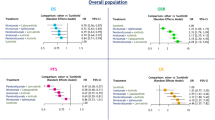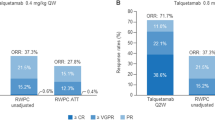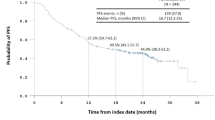Abstract
Background
Follicular lymphoma (FL) is the most common type of non-Hodgkin lymphoma (NHL), with indolent progression. Several treatment options are selected, based not only on disease status, quality of life (QOL), and age of patient, but also on recent increasing medical costs. We retrospectively analysed the first-line treatment of FL with regard to treatment outcomes and medical economics, and discuss the appropriate strategies for FL.
Methods
Data on a total of 69 newly-diagnosed patients with FL was retrospectively collected from 2001 to 2015.
Results
The median age of the patients was 60 years and the median follow-up was 58 months. A total of 25 cases with FL were treated with R monotherapy, and 28 cases were treated with R-CHOP as first-line treatment. The factors affecting the decision of physicians to use R or R-CHOP treatment were serum level of lactate dehydrogenase (LDH) and disease stage. The first-line treatment-associated survival did not show any statistical differences between R and R-CHOP. The average hospitalization and average of all medical costs during the first-line treatment were 4.1 days (R) versus 55.7 days (R-CHOP), and JPY 1,707,693 (USD 15,324) (R) versus JPY 2,136,117 (USD 19,170) (R-CHOP), respectively.
Conclusion
R monotherapy for patients whose diseases show low tumor burden and who are not candidates for local treatment has benefits as a first-line treatment compared to R-CHOP, based on the patients’ QOL and medical economics.



Similar content being viewed by others
References
Lo Coco F, Gaidano G, Louie DC et al (1993) P53 mutations are associated with histologic transformation of follicular lymphoma. Blood 82:2289–2295
Elenitoba-Johnson KS, Gascoyne RD, Lim MS et al (1998) Homozygous deletions at chromosome 9p21 involving p16 and p15 are associated with histologic progression in follicle center lymphoma. Blood 91:4677–4685
Pinyol M, Cobo F, Bea S et al (1998) P16(INK4a) gene inactivation by deletions, mutations, and hypermethylation is associated with transformed and aggressive variants of non-Hodgkin’s lymphomas. Blood 91:2977–2984
Lossos IS, Alizadeh AA, Diehn M et al (2002) Transformation of follicular lymphoma to diffuse large-cell lym-phoma: alternative patterns with increased or decreased expression of c-myc and its regulated genes. Proc Natl Acad Sci USA 99:8886–8891
Akasaka T, Lossos IS, Levy R (2003) BCL6 gene translocation in follicular lymphoma: a harbinger of eventual transformation to diffuse aggressive lymphoma. Blood 102:1443–1448
Brodtkorb M, Lingjaerde OC, Huse K et al (2014) Whole-genome integrative analysis reveals expression signatures predicting transformation in follicular lymphoma. Blood 123:1051–1054
Vasishtha M, Messina M, Holmes AB et al (2014) Genetics of follicular lymphoma transformation. Cell Rep 6:130–140
Bai B, Huang HQ (2015) Individualized management of follicular lymphoma. Chin Clin Oncol 4:7. doi:10.3978/j.issn.2304-3865.2015.01.01
Izutsu K (2014) Treatment of follicular lymphoma. J Clin Exp Hematop 54:31–37
Hiddemann W, Cheson BD (2014) How we manage follicular lymphoma. Leukemia 28:1388–1395
Kenkre VP, Kahl BS (2012) What is the best initial therapy for a patient with symptomatic low-grade follicular lymphoma? Cancer J 18:383–389
Bello C, Zhang L, Naghashpour M (2012) Follicular lymphoma: current management and future directions. Cancer Control 19:187–195
Salles G, Ghesquières H, Bachy E (2012). What is the best first-line treatment strategy for patients with indolent lymphomas? Am Soc Clin Oncol Educ Book, pp 488–493
McLaughlin P (2011) Management options for follicular lymphoma: observe; R-CHOP; B-R; others? Clin Lymphoma Myeloma Leuk 11(Suppl 1):S91–S95. doi:10.1016/j.clml.2011.04.006
van Agthoven M, Kramer MH, Sonneveld P et al (2005) Cost analysis of common treatment options for indolent follicular non-Hodgkin’s lymphoma. Haematologica 90:1422–1432
Schmitz S, Aly F, Steinmetz T et al (2006) Sensitivity analysis of cost factors for various therapy options in the treatment of follicular lymphoma. Onkologie 29:258–264
Soini EJ, Martikainen JA, Vihervaara V et al (2012) Economic evaluation of sequential treatments for follicular non-Hodgkin lymphoma. Clin Ther 34:915–925
Johnston KM, Bolbocean C, Connors J et al (2012) Cost-effectiveness of rituximab in follicular lymphoma. Expert Rev Pharmacoecon Outcomes Res 12:569–577
Prica A, Chan K, Cheung M (2015) Frontline rituximab monotherapy induction versus a watch and wait approach for asymptomatic advanced-stage follicular lymphoma: a cost-effectiveness analysis. Cancer 121:2637–2645
Danese MD, Reyes CM, Gleeson ML et al (2016) Estimating the population benefits and costs of rituximab therapy in the United States from 1998 to 2013 using real-world data. Med Care 54:343–349
Solal-Céligny P, Roy P, Colombat P et al (2004) Follicular lymphoma international prognostic index. Blood 104:1258–1265
Milanovic N, Matkovic S, Ristic D et al (2012) Significance of tumor burden, vascular endothelial growth factor, lactate dehydrogenase and beta-2 microglobulin serum levels in advanced diffuse large B cell lymphoma. J BUON 17:497–501
Kahl BS, Hong F, Williams ME et al (2014) Rituximab extended schedule or re-treatment trial for low tumor burden follicular lymphoma: Eastern Cooperative Oncology Group protocol E4402. J Clin Oncol 32:3096–3102
Palla AR, Hamadani M (2013) Rituximab maintenance versus retreatment in follicular lymphoma. Hematol Oncol 31:171–178
Johnston A, Bouafia-Sauvy F, Broussais-Guillaumot F et al (2009) Retreatment with rituximab in 178 patients with relapsed and refractory B-cell lymphomas: a single institution case control study. Leuk Lymph 51:399–405
Rummel MJ, Niederle N, Maschmeyer G et al (2013) Bendamustine plus rituximab versus CHOP plus rituximab as first-line treatment for patients with indolent and mantle-cell lymphomas: an open-label, multicentre, randomised, phase 3 non-inferiority trial. Lancet 381:1203–1210
Flinn IW, van der Jagt R, Kahl BS et al (2014) Randomized trial of bendamustine-rituximab or R-CHOP/R-CVP in first-line treatment of indolent NHL or MCL: the BRIGHT study. Blood 123:2944–2952
Acknowledgements
We appreciate the cooperation of the staff members of the chemotherapy room in Ehime University Hospital.
Author information
Authors and Affiliations
Corresponding author
Ethics declarations
Conflict of interest
The authors have no conflict of interest.
About this article
Cite this article
Muneishi, M., Nakamura, A., Tachibana, K. et al. Retrospective analysis of first-line treatment for follicular lymphoma based on outcomes and medical economics. Int J Clin Oncol 23, 375–381 (2018). https://doi.org/10.1007/s10147-017-1202-2
Received:
Accepted:
Published:
Issue Date:
DOI: https://doi.org/10.1007/s10147-017-1202-2




